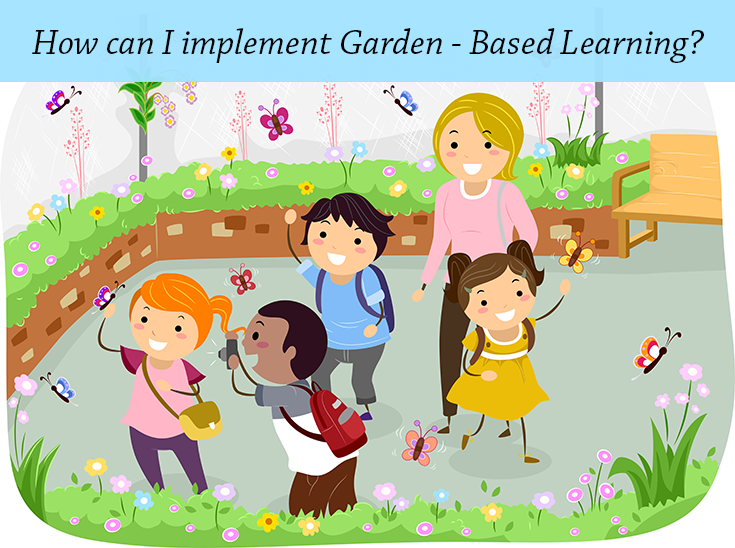How Can I Implement Garden-Based Learning?
Posted by Network Support · Leave a Comment
Gardens are living classrooms with great potential for learning…
Garden-based learning is a wonderful and exciting way to make almost any classroom curriculum come alive and show “real-life” meaning to students as they learn. This form of learning encompasses programs, activities and projects in which the garden is the foundation for integrated learning, in and across disciplines, through active, engaging real-world experiences that have personal meaning for students, adults and communities.
In some settings it is the educational curriculum and in others it supports or enriches the curriculum. Nevertheless, garden-based learning has been viewed as contributing to all aspects of basic education, including academic skills, personal development, social development, moral development, vocational skills and life skills.
Benefits of garden-based learning
Garden-based learning environment can foster science literacy and social skills among students, while enhancing an awareness of the link between plants in the landscape and our clothing, food, shelter, and well-being. Gardening projects can provide students with the carefree exploration of the natural world as well as give them the chance to develop a wide range of academic and social skills. Here are some noted benefits of garden-based learning programs for students:
Increased nutrition awareness: Students who participate in garden-based learning programs tend to increase their consumption of fresh fruits and vegetables, and gained a new enthusiasm for fresh, nutritious vegetables they grew.
Increased environmental awareness: Students gain more positive attitudes about environmental issues after participating in a school garden program. Gardening has also been shown to increase scores on environmental attitude surveys of elementary school children.
Higher Learning: Students who participate in school gardening activities score significantly higher on science achievement tests compared to students who do not.
Increased Life Skills: Garden programs enhance moral education, increases appreciation for nature, increases responsibility, develops patience, increases in relationship skill, increases self-esteem, helps students develop a sense of ownership and responsibility, and helps foster relationships with family members.
Below are listed some practical and feasible ideas that can help teachers implement garden-based learning:
1. Academic Enrichment
Gardens can function as living laboratories. Students who participate in gardening have a considerable increase in grade point average, absorb new learning styles, and develop their perspectives and ways of learning to incorporate critical 21st-century skills such as curiosity, flexibility, open-mindedness, informed skepticism, creativity, and critical thinking.
In the classroom:
Create a Garden for observation and discovery: Have students observe the growth or decay activity in their plot, or chart what foods are grown in specific global regions.
Build rain gauges: Incorporate this into math lessons to learn about measurements and volume, or a bulb growth chart to look for growth patterns.
Read & cook: Have students read through garden cookbooks, and even create their own recipe books from their garden cooking experiments to enhance literary skills.
2. Food and Nutrition
According to Feeding America, giving children proper nutrition and access to food can impact “physical and mental health, academic achievement, and future economic prosperity.” Gardens can be an integral part in providing nutrition to children.
In the classroom:
Out-of-school-time program: Create partnerships between schools and out-of-school-time programs so that the food gap is filled for low-income families when school is out.
On site visits: Visit programs – Real Food Rising, Urban Roots Austin, and The Food Project – for examples of how communities are combining youth leadership and food access.
3. Ecological Sustainability
Composting and waste reduction teach students sustainable energy practices. Not only does composting add nutrients to the soil, it teaches students various aspects of sustainable energy and energy conservation by recycling of waste.
In the classroom:
Plant fruit trees: Plant around your neighborhood in order to contribute to your community’s nutrition and air quality.
Plant a tree: If a small act of planting trees on the corner can make a dent in the sustainability of a neighborhood, think about the impact that trees and gardens across the world can make on our global food chain! So go ahead and plant trees in and around your school and neighborhood.
4. Behavior & Attitudes
Working in school gardens has been shown to influence the social and emotional development of students. Thus, encouraging students to participate in hands-on gardening activities will improve their behavior and attitudes.
In the classroom:
Care & compassion: Make your students participate in hands-on gardening activities to instill concern and willingness to care for living things among them.
Experience: Encourage students to try new things during gardening activities. This will allow them to take risks, thereby extending their experiences and abilities.
Positive attitude: Persuading students towards hands-on gardening will help change student’s attitudes towards school and the interpersonal relationships they have with their teachers and other students.
Needless to say, exploring the garden rewards student’s curiosity about the world outside the classroom, imparting them with the inquisitive drive that is fundamental to the basic learning process. Field trips to community gardens and farmers’ markets can inspire young minds. Thus, gardens – inside or outside, big or small – will support academic and 21st-century skills development for your students.
Like this article for teachers?
Browse the Professional Learning Board COURSE CATALOG to find related online courses for teachers in your state. Professional Learning Board is a leading provider of online professional development classes that teachers use to renew a teaching license or renew a teaching certificate.





